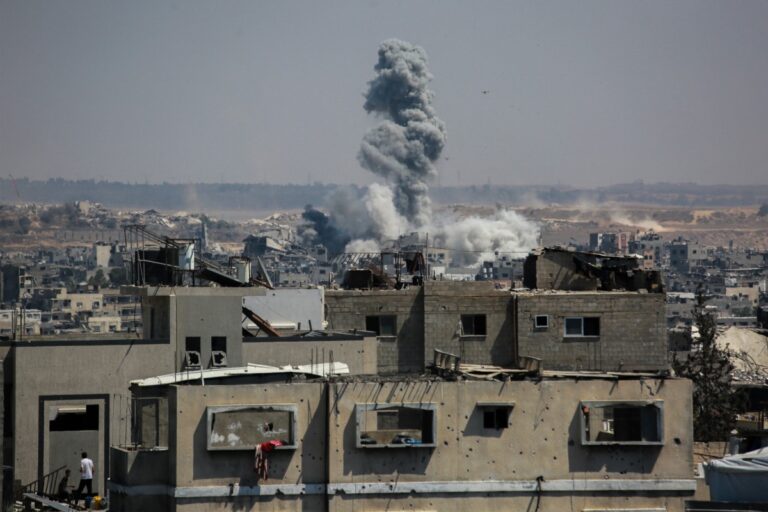By Peter Omopo | July 31, 2025
JERUSALEM — U.S. President Donald Trump’s Middle East envoy, Steve Witkoff, arrived in Israel on Thursday as the humanitarian catastrophe in Gaza draws intensifying international criticism. Nearly 22 months of unrelenting war, extreme food shortages, and stalled ceasefire negotiations have deepened the crisis and widened Israel’s global isolation.
Witkoff’s visit comes on the heels of a deadly incident on Wednesday night in which dozens of Palestinians were reportedly shot as they scrambled for humanitarian aid in northern Gaza. Gaza’s civil defence agency said at least 58 people were killed after Israeli forces opened fire on a crowd that had surrounded an aid convoy.
The Israeli military acknowledged firing “warning shots” to disperse the crowd but denied knowledge of casualties. However, an AFP correspondent confirmed seeing multiple bullet-riddled bodies at Gaza’s al-Shifa Hospital. “When people saw thieves stealing and dropping food, the hungry crowd rushed in hopes of getting some,” said Jameel Ashour, a mourner at the hospital who lost a relative in the incident.
Witkoff is expected to meet Israeli Prime Minister Benjamin Netanyahu to discuss humanitarian corridors, the impasse in ceasefire negotiations with Hamas, and the next steps in addressing Gaza’s worsening plight. Israeli media also report he may visit a U.S.-backed aid group operating in the region.
Witkoff has been central to U.S. involvement in the indirect negotiations between Israel and Hamas. Those talks collapsed last week when both Israeli and American delegations withdrew from meetings in Doha.
The situation on the ground continues to deteriorate. The Hamas-run health ministry reported that the Israeli military campaign has now killed over 60,249 Palestinians since the conflict began in October 2023, following a Hamas-led attack that left 1,219 Israelis dead and 251 kidnapped. Of those abducted, 49 are still believed to be held in Gaza, with 27 confirmed dead by Israel’s military.
In the latest escalation, another 32 Palestinians were reportedly killed in separate Israeli strikes across the territory on Thursday, according to civil defence sources. Media access in Gaza remains heavily restricted, and figures from local authorities are difficult to independently verify.
The humanitarian situation has triggered outrage across the globe, with aid agencies and UN officials warning that famine is now unfolding in Gaza. Shocking images of malnourished children have sparked calls for urgent action from global powers, including the UK, France, and Canada.
Canadian Prime Minister Mark Carney announced Canada’s decision to recognise a Palestinian state, stating there was “no room for delay in coordinated international action to support peace.” Israel condemned the move as “part of a distorted campaign of international pressure,” while Trump warned that such actions could jeopardize ongoing trade negotiations between the U.S. and Canada.
Despite Trump’s historically strong support for Israel, recent developments have put his administration at odds with Netanyahu’s government. Earlier this week, Trump publicly contradicted Netanyahu by warning that Gaza faces “real starvation,” and pledged increased U.S. aid to the enclave.
Sources close to the Trump campaign say there is growing concern that the former president’s core “MAGA” base in the U.S. — once staunchly pro-Israel — may be turning against Netanyahu’s tactics in the conflict.
Meanwhile, German Foreign Minister Johann Wadephul was also expected in Jerusalem for consultations with Israeli leaders, adding to the mounting international pressure on Israel to agree to a ceasefire and allow unfettered humanitarian access to Gaza.
In a separate appeal on Thursday, Gaza’s health ministry urged residents not to loot a new convoy, warning it carried only medical supplies for overwhelmed hospitals, not food. The convoy had entered through the Zikim crossing en route to facilities managed by the World Food Programme and World Central Kitchen before crowds intercepted it and shooting broke out.
As the bloodshed and hunger deepen, the world continues to watch, pressuring both Israel and Hamas to return to the negotiation table and halt what the United Nations now warns could become one of the worst humanitarian disasters of the 21st century.

